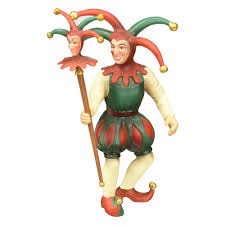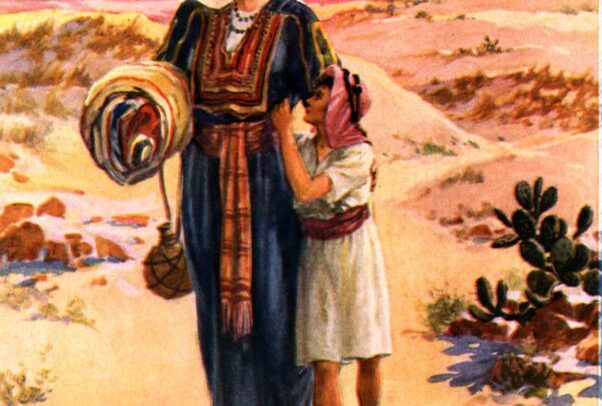Raboyseyee and Ladies,
They say one cannot dance at two weddings at the same time. That may be true but last night, the heylige Ois did try his best by attending two different weddings a bunch of miles apart and we begin with s shout out to both.
A big mazel tov to Tamara and Stephen Wagner upon the marriage of their son Judah to Elisheva Chabus, she the beautiful daughter of Liba and Aryeh Leib Chabus, they from Rockland County. Mazel tov to both extended families. May Judah and Elisheva be zoche to build a beautiful home and life together.
And a huge mazel tov as well to chaver Steven (Simcha) Klaver upon his marriage to Shoshana Yachnes, she the beautiful daughter of Rabbi and Mrs. Avrohom Yachnes, they of North Miami Beach. So happens that the future Ois was in Camp Mogen Avrohom 57 years ago with now Rabbi Yachnes, then known as Yingi Yachnes; wow! May Steve and Shoshana merit to enjoy many years of blissful marriage and mazel tov to both extended families.
Was Yishmoel a Predator?
We shall address that below but let us begin here. Back in 2020, the heylige Ois took a deep dive into Yishmoel, Avrohom’s first son -given to him by Hogor- and concluded that Yishmoel was not a bad guy, not at all. According to some opinions in the heylige Gemora (Buba Basra 16b), and the medrish in Vayikra Rabah 26:7, although Yishmoel had his ups and downs, ultimately, he repented and was considered righteous.
This year, and specifically these past few weeks, as we deal with his descendants -some of whom are trying to kill us all, I thought we should revisit the topic and try chapping why many a medrish painted him so ugly and convicted him of crimes he likely did not commit. Check out the archives and read the 2020 post here: https://oisvorfer.com/vayero-2020/

Welcome to Parshas Vayero where the imagination of our sages ran wild about Yishmoel’ s personality and behavior. They badmouth him terribly and tear him a new a-hole (tuchis-hole). We are about to read all about it and let’s set the scene. Halt kup (pay close attention). A newly circumcised Avrohom gets Soro (previously barren) pregnant and at 100 years of age, he becomes a father again to his child born to Soro and names the boy Yitzchok. So far so good. Yishmoel is now all of 14 years old.
Ober, just like that, one posik later, Yishmoel’s life is about to get turned upside down. What happened? What did Yishmoel do or say that changed everything? One word in one posik changed everything. What did Soro do? Did the RBSO agree with her actions? What grave sin did Yishmoel commit? How old was Yishmoel when all this went down? Was he but a baby? A teenager? Let’s dig further.
Following the one mystery word, Soro demands that Avrohom expel Hogor and her son Yishmoel out of the tent she shared with her husband. She had seemingly become convinced that this Yishmoel was epes a very bad child, but why? Was he suddenly a bad actor? Was he deserving what he was about to get? Seemingly, so bad was Yishmoel that even his name was to become taboo; do we -in today’s times know one person with that name? Not! Moreover, do we not read in Proverbs (10:7), “The name of the wicked should rot [and not be remembered].” We do! And does not the heylige Gemora (Yoma 38b) interpret this to mean that one should not give a child the same name as a rosho, a wicked person? We do! And does not Rabaynu Chnanale teach us that bearing the same name as a wicked person can adversely affect the child’s character? He does! What’s pshat? What grave sin did Yishmoel commit? Let’s find out.
Let us read the one relevant posik and find out what Yishmoel may have done that gave many a medrish license to paint him with an ugly brush. Says the heylige Toirah (Bereishes 21:9) azoy: Soro sees Yishmoel beingמְצַחֵק (metzachake) and tells Avrohom to banish the boy. The word, specifically when used as a verb, has long been interpreted innocently, as laughing or playing. Yet, according to a few exegetes looking to hang Yishmoel, the word is associated with bad behavior.
Let us chazir: Soro, unable to conceive a child for her husband gives Avrohom her maid, Hogor, who gives birth to a son who is named Yishmoel (Bereishis 16). So far so good. Thirteen years later, when she is ninety years old (Bereishis 17:17), Soro miraculously becomes pregnant, and gives birth to Yitzchok (Bereishis 21:1–7). The next posik -21:8- fast forwards to when Yitzchok is a toddler, and Soro is disturbed by Yishmoel: check out the bolded word at the end of the posik.
בראשׁית כא:ח וַיִּגְדַּל הַיֶּלֶד וַיִּגָּמַל וַיַּעַשׂ אַבְרָהָם מִשְׁתֶּה גָדוֹל בְּיוֹם הִגָּמֵל אֶת יִצְחָק. כא:ט וַתֵּרֶא שָׂרָה אֶת בֶּן הָגָר הַמִּצְרִית אֲשֶׁר יָלְדָה לְאַבְרָהָם מְצַחֵק.
“The child [Yitzchok] grew and was weaned; and Avrohom made a great feast on the day that Yitzchok was weaned. 21:9 But Soro saw the son of Hogor the Egyptian, whom she had borne to Avrohom. He was metzachake.” Gotcha! Soro is so angry she has the boy banished. “So she said to Avrohom, “Cast out this slave woman and her son; for the son of this slave woman shall not inherit along with my son with Yitzchok.”
בראשׁית כא:י וַתֹּאמֶר לְאַבְרָהָם גָּרֵשׁ הָאָמָה הַזֹּאת וְאֶת־בְּנָהּ כִּי לֹא יִירַשׁ בֶּן־הָאָמָה הַזֹּאת עִם־בְּנִי עִם־יִצְחָק.

What exactly did Yishmoel do and why did it so anger Soro? Why would Yishmoel’s ‘playing’ bother her so much? Aren’t brothers supposed to play? Wasn’t it nice of Yishmoel to be playing with his much younger brother? Let’s get real: thirteen years is a huge age difference. And, says the Ibn Ezra, azoy: For this is what all boys do (play). And [Soro] was jealous of him because he was older than her own son, Yitzchok.
כי כן מנהג כל נער. ותקנא בו בעבור היותו גדול מבנה.

According to this pshat, Soro was not really upset about Yishmoel playing, but was simply concerned that as the older boy, he would inherit in place of Yitzchok, her son. Since he is the son of the shiksa maidservant, it is not fitting that he play with the son of the mistress of the house, and from there, he will try to make himself an equal (with her son) and in the end, even with regard to inheritance. Did Soro, according to this pshat do the right thing?
Is this the first time Soro invoked the word metzachake when describing or retelling an event? Not! Earlier in the story, Soro herself laughed when she heard that she will become pregnant and deliver a child. In fact, she stated that “a laughter, a tzechok” was perpetrated on her. Was Soro a victim of psychological abuse when -after giving birth- people laughed –tzachaq-ed- at her for having had a baby in her old age? Does the word -in both forms -verb and noun- mean the same? Is the laughing Yishmoel is accused of in our parsha, bad? Laughing seems good. Is that a reason for his banishment? What’s pshat here? Why taka was Soro insistent that he and his mother be banished? Could it be that his laughing – his being metzachake- had another deeper and darker and more sinister meaning? Say it’s not so but was that the case?

Let us go back and find the word metzachake and how it’s used. So happens that mamish in our parsha, we come across this very word -in some form -several times- and let us scroll ahead to the third aliya where the RBSO -through His angels- warns Loit to skedaddle out of Sedoim; the RBSO is about to destroy that city. As an aside, that happens when its inhabitants are doing bad things. Back to Loit who has been warned by two angels that Sodom will be destroyed imminently, and he should gather his loved ones and escape. In addition to his two unmarried daughters who lived at home, Loit had daughters married to local men. Loit tries to convince to leave Sodom with him before the RBSO destroys it, but his sons-in-law do not take his warning seriously. Let’s read the key word in the posik below. Again, check out the bolded word.
בראשית יט:יד וַיֵּצֵא לוֹט וַיְדַבֵּר אֶל חֲתָנָיו לֹקְחֵי בְנֹתָיו וַיֹּאמֶר קוּמוּ צְּאוּ מִן הַמָּקוֹם הַזֶּה כִּי מַשְׁחִית יְ־הֹוָ אֶת הָעִיר וַיְהִי כִמְצַחֵק בְּעֵינֵי חֲתָנָיו.
“So Loit went out and spoke to his sons-in-law, who had married his daughters, and said, “Up, get out of this place, for the RBSO is about to destroy the city.” But he seemed to his sons-in-law as a metzachake.” OMG, seen as what? As a metzachake? What does that word mean? Chabad on-line has this: “So Lot went forth and spoke to his sons-in-law, the suitors of his daughters, and he said, “Arise, go forth from this place, for the Lord is destroying the city,” but he seemed like a comedian in the eyes of his sons-in-law.” Sefaria has this: So Lot went out and spoke to his sons-in-law, who had married his daughters, and said, “Up, get out of this place, for יהוה is about to destroy the city.” But he seemed to his sons-in-law as one who jests. Was Loit a jester or a comedian?

Exactly what the sons-in-law were thinking, ver veyst? Could it be they knew he was serious, but he and what he was saying seemed “ridiculous” to them? Could be. Let’s also read this story from the heylige Novee (Shoiftim 1`6:25) where following the capture of Shimshon Hagibor (Samson), he was blinded, kept tied up in a prison in Gaza. Gaza? OMG! As an aside, we need the RBSO to take charge in modern day Gaza, omen! Back to the Novee where one day, during a party, the people decided to bring Shimshoin out to entertain the guests: “As their spirits rose, they said, “Call Samson here and let him play for us.” Samson was fetched from the prison, and he tzacheq-ed for them. Then they put him between the pillars.
וַיְהִי [כְּטוֹב] (כי טוב) לִבָּם וַיֹּאמְרוּ קִרְאוּ לְשִׁמְשׁוֹן וִישַׂחֶק לָנוּ וַיִּקְרְאוּ לְשִׁמְשׁוֹן מִבֵּית [הָאֲסוּרִים] (האסירים) וַיְצַחֵק לִפְנֵיהֶם וַיַּעֲמִידוּ אוֹתוֹ בֵּין הָעַמּוּדִים.
What was Shimshon doing there? Dancing? Performing? One thing is zicher: Certainly, he was in no mood to tell jokes. Whatever he may have done, the point is that the entertainment he provided them was not a performance as he was being utterly humiliated. Here he was blinded and tamed, acting on the demands of his captors. The degradation of Shimshon is what causes the audience to laugh. Ober, how is this storyline connected to Yishmoel? In keeping with this meaning of the term, a number of medroshim suggest that Yishmoel was engaged in mocking behavior. He mocked Avrohom and Soro, who were joyous about their son Yitzchok. Apparently, he did this during the party.
מלגלג על אברהם ושרה השמחים בבנם יצחק. כנראה עשה זאת בשעת המשתה.
And taka so says Rebbe Saadia Gaon: “according to the simple meaning, Yishmoel was mocking Yitzchok.” Ramban agrees:
וראתה אותו מלעיג על יצחק או על המשתה הגדול
She saw him -Yishmoel- jeering at Yitzchok or at the large party [in his honor]. And the Radak adds this:
כאלו מלעיג על יצחק שנולד מזקנים.
Some commentators add that Yishmoel was mocking Yitzchok because he was worried that he would lose access to the inheritance now that Avrohom’s main wife had a son. While the translation “mocking” picks up the negative connotation of the verb, this is not the way the word is used in the Loit and Samson storylines. There, the metzachake is the object of the scorn who appears ridiculous, not the one mocking others, as would be the case for Yishmoel here.
The bottom line: seemingly the word metzachake has more than one meaning, perhaps a few, but is there yet another? One even more sinister? Can the word metzacake -in one form or another- have some sexual connotations? Doesn’t everything? And so it does epes appear from and in the heylige Toirah. Mamish? Coming up in a few weeks, we will read how our favorite Toirah character Yoisef was accused by Mrs. Potiphar of not just of attempted rape but also of le’tzachake. He did what? Was accused of being le’tzachake? What the hec does that mean? Let us read the posik innaveynig. Says the heylige Toirah (Bereishis 39:14), azoy:
וַתִּקְרָא לְאַנְשֵׁי בֵיתָהּ וַתֹּאמֶר לָהֶם לֵאמֹר רְאוּ הֵבִיא לָנוּ אִישׁ עִבְרִי לְצַחֶק בָּנוּ בָּא אֵלַי לִשְׁכַּב עִמִּי וָאֶקְרָא בְּקוֹל גָּדוֹל.
“When Yoisef is a slave in the house of Potiphar, Mrs. Potiphar, his master’s wife attempts to seduce him. When she fails, she concocts a story according to which Yoisef tried to take advantage of her when he found her alone in the house. First, she tells this story to the house servants: The connotation here is sexual: Yoisef wanted her. She repeats the story again to her husband. She tells him that Yoisef wanted and intended “to lie with me.” Says the heylige Toirah Bereishis 39:17), azoy: “She told him the same story, saying, “The Hebrew servant, whom you have brought among us, came in to me to tzachake with me…”
בראשׁית לט:יז וַתְּדַבֵּר אֵלָיו כַּדְּבָרִים הָאֵלֶּה לֵאמֹר בָּא־אֵלַי הָעֶבֶד הָעִבְרִי אֲשֶׁר־הֵבֵאתָ לָּנוּ לְצַחֶק בִּי.
With this accusation, Potiphar’s wife communicates not only that Yoisef tried to have sex with her, but that he was humiliating her, and by extension Potiphar too. Shoin, what do we have here? One word used in several forms with, and with several meanings. But wait, there’s more; there is yet another mention of the word or a derivation of the word, also in our parsha. Let’s read that one.

In a few weeks, Parshas Toldos, we will read (Bereishis 26:8-9) how King Avimelech -perhaps the first ever peeping tom- looked out his window and into the window of Yitzchok and Rivka. What did he see? Let’s review the storyline. When Yitzchok moves to the city of Geror, he pretends that Rivka is his sister, but his behavior with her eventually tips off King Avimelech to the truth. Let us read thew posik and find the magic word;
| And it came to pass, when he had been there for many days, that Abimelech, the king of the Philistines, looked out of the window, and he saw, and behold, Isaac was jesting with Rebecca his wife. | חוַיְהִ֗י כִּ֣י אָֽרְכוּ־ל֥וֹ שָׁם֙ הַיָּמִ֔ים וַיַּשְׁקֵ֗ף אֲבִימֶ֨לֶךְ֙ מֶ֣לֶךְ פְּלִשְׁתִּ֔ים בְּעַ֖ד הַֽחַלּ֑וֹן וַיַּ֗רְא וְהִנֵּ֤ה יִצְחָק֙ מְצַחֵ֔ק אֵ֖ת רִבְקָ֥ה אִשְׁתּֽוֹ: |
He was doing what? He was metzacheq-ing his wife Rivka; omg! Avimelech called for Yitzchok, and said, “So she is your wife! Why then did you say, ‘she is my sister?’’ From Avimelech’s reaction, which expresses that he is certain that Rivka is Yitzchok’s wife and not his sister, it is clear that Yitzchok wasn’t laughing with her or telling her a joke, but engaging in tashmish (sexual activity), or at least sexual play, with his eishes chayil. Yet another definition of that metzachke word. Why the window was open and or the curtain not drawn, ver veyst? The bottom line: The use of the word metzachake highlights how Avimelech exposed Yitzchok as having lied. Yitzchok must accept Avimelech’s humorous/humiliating deduction that Rivka was clearly not simply his sister based on what he saw them doing. Were we meant to chuckle at Yitzchok’s expense, thinking that this is not something a man does with his sister, nor something he wishes to do even with his (secret) wife, in full view of the local monarch peeping through a window? Ver veyst?
The bottom line: we have seen several uses and meanings of the word but how are any of them at all related to the title of this week’s post? Was Yishmoel a molester? A sexual predator? Shoin, to answer that question, let’s go Veyter. Let’s check out this wild medrish (Bereishis Rabbah 53) where we find this:
דרש ר’ עקיבא… אין מצחק אלא גילוי עריות. היך דאת אמר לצחק בי
Rebbe Akiva taught: “…Metzachake means sexual transgression, as it says [in the Yoisef story, when Potiphar’s wife addressed her husband]: ‘to tzachake with me.’
מלמד שהיתה שרה רואה את ישמעאל מכבש גנות וצד נשי אנשים ומענה אותן,
This teaches that Soro would see Yishmoel forcing his way into gardens, grabbing hold of other men’s wives, and raping them.” Well, blow me down. And if that weren’t enough to get him expelled, the medrish continues and piles other sins onto him as well. They include idolatry (ironically Rebbe Yishmoel’s interpretation) and murder (Rebbe Elazar’s interpretation). Did Yishmoel do all these things? Ver veyst but it’s medrish where -like on CNBC- anything goes. The bottom line: according to these folks, Yishmoel was a bad and dangerous person and Soro did the right thing. Interestingly, none of this is mentioned in the heylige Toirah where Yishmoel is an excellent son to his mother and very respectful to his father Avrohom even though he threw him out of the house and left him to die. From a plain reading of the heylige Toirah, Yishmoel is all good. Moreover, he has been selected by the RBSO Himself for greatness.
While sexual violence is an interesting pshat as to why Soro wanted him expelled, let’s get real: painting Yishmoel -as does the medrish and specifically Rebbe Akiva- as crashing through people’s yards as would a serial rapist, is more than a shtikel vild (wild) and certainly more than is necessary as an excuse for his expulsion.
But wait, there’s more! In the Greek Old Testament -yes, even biblical scholars agree that the first five books of the heylige Toirah were translated from Biblical Hebrew into Greek, more on that another day- we find a few words which might justify Soro’s behavior. There we find these words: וַתֵּרֶא שָׂרָה אֶת־בֶּן־הָגָר הַמִּצְרִית… מְצַחֵק אֵת יִצְחָק בְּנָה
These words, taken together with Rabbi Akiva’s pshat that being metzachake involved forbidden sexual relationships, one can chap Soro’s disgust with Yishmoel. The bottom line: according to this medrish, Soro witnessed Yishmoel molesting her son. We can better chap Soro’s anger, and her need to send Yishmoel away. His indecent and abhorrent behavior warranted his expulsion from the family. According to this pshat, Soro, was protecting her son from the sexual predator in their midst. Is this real pshat? Ver veyst but not what the heylige Toirah tells us, not at all.
The final bottom line: the heylige Toirah told us why Soro banished Yishmoel and why Avrohom agreed with her decision. For a reason the RBSO never told us, the RBSO was Ok with Yishmoel’s banishment. For his troubles, the RBSO saved his life and ultimately rewarded him with great success. Famous rabbis are named after him. That being said, for certain exegetes, that wasn’t enough; they wanted blood and created plenty of it by accusing Yishmoel of various crimes -including rape and molestation- he likely did not commit.

A Gittin Shabbis!
The Heylige Oisvorfer Ruv
Yitz Grossman
